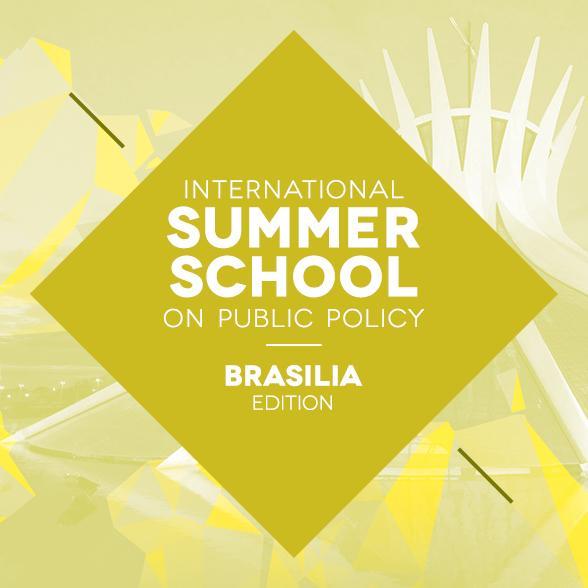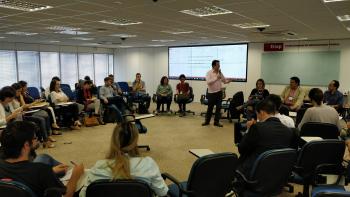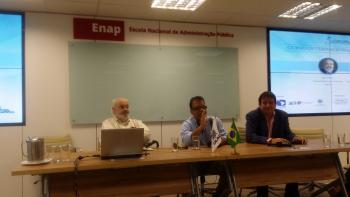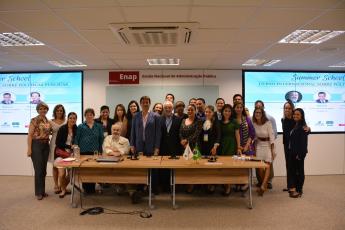Thank you for your message. The IPPA team will get back to you shortly. You first need to login here.





The International Summer Schools on Public Policy - Brasilia is organized in collaboration with ENAP, University of Brazilia, and FLACSO. These Summer Schools are part of the programming academic of the Ibero-american School of Public Policy and Administration (EIAPP), with the support of the Latin American Faculty of Social Sciences (FLACSO), and are open to Ph.D. students and civil servants from Brazil and other countries of Latin America. The main objective of this International Summer Schools are to provide advice and knowledge on public policy theories, concepts, and methodologies in policy analysis.
The first edition took place from 28 November to 2 December 2016 and gathered 60 Ph.D. and young scholars and 3 researchers around 6 lectures :
- The Political Process of Policymaking by Philippe Zittoun, University of Lyon
- Pursuing Horizontal Management: The Politics of Public Sector Coordination by Guy Peters, University of Pittsburgh
- Politics of Representative Bureaucracy by Guy Peters, University of Pittsburgh
- Advanced Introduction to Public Policy by Guy Peters, University of Pittsburgh
- Varieties of Governance: Dynamics, Strategies, Capacities by M Ramesh, Lee Kuan Yew School of Public Policy
- Routledge Handbook of Public Policy by M Ramesh, Lee Kuan Yew School of Public Policy
After the success of the first edition of the International Summer School on Public Policy - Brasilia, the second edition opened from May 15 to 19, 2017 in Brasilia to 70 Ph.D. and young scholars.
- Implementation and Evaluation: Integrating Empirical and Normative Assessments by Franck Fischer, Rutgers University
- Policy Formulation: Policy Expertise, Evidence and Cost-Benefit Analysis by Franck Fischer, Rutgers University
- Incrementalism versus punctuations. The Punctuated equilibrium model by Laura Chaquès Bonafont, University of Barcelona
- Agenda-Setting: Political Competition, Advocacy Coalitions, and Policy Argumentation by Franck Fischer, Rutgers University
- Policy Instruments and Policy Design by Gilberto Capano, University of Bologna
- In Pursuit of Usable Knowledge: Between Empirical Evidence and Social Equity by Franck Fischer, Rutgers University
- History and Theory of Public Policy: Policy Problems, Analytic Criteria and Explanatory Models by Franck Fischer, Rutgers University
The third edition of the Summer School - Brasilia Edition was held almost right after the second edition from December 10 to 15, 2017, and brought together 4 researchers and 71 Ph.D. and young scholars from Brazil, Uruguay, Argentina, Cameroon, Iran, France, UK, Ghana and Israel.
- Policy design by Guy Peters, University of Pittsburgh
- The Political Process of Policymaking by Philippe Zittoun, University of Lyon
- Policy Coordination by Charlotte Halpern, Sciences Po Paris
- Policy Design by M. Ramesh, Lee Kuan Yew School of Public Policy
Finally, the Escola Nacional de Administração Pública (ENAP) and the International Public Policy Association (IPPA) came together for a fourth edition from December 10 to 14, 2018. 103 Ph.D. and young scholars attended this edition from Brazil (17), South America (9), Asia (6), Africa (5), Europe (4) and North America (3).
- Policy design by Guy Peters, University of Pittsburgh
- Policy dynamics and Interest Organizations by Laura Chaqués-Bonafont, University of Barcelona
- Public policy process: Theory, Politics and Methods by Frank Fischer, Rutgers University
- Policy Coordination by Charlotte Halpern, Sciences Po Paris
- Policy Evaluation and Policy Process by Giliberto Capano, University of Bologna
- Policy Design by M. Ramesh, Lee Kuan Yew School of Public Policy
After a break period of several years, the International Summer School in Brasilia came back for a fifth edition in 2023 from May 8 to 12. The Summer School was interactive and delivered by renowned international scholars namely, Charlotte Halpern (Sciences Po Paris), Laura Chaques (University of Barcelona), Giliberto Capano (University of Bologna), and Philippe Zittoun (University of Lyon). 35 participants from Brazil, Japan, Portugal, and the United Kingdom were allocated to 3 groups of 10 to 15 Ph.D. students, and Early Career Researchers focused on providing valuable comments for research and discussing research projects or case studies.
- To access the video recording of Philippe Zittoun's lecture on "Understand the politics of policymaking", click here.
- To access the video recording of Giliberto Capano's lecture on "Public Policy and Crisis Management: Theoretical and Methodological Challenges", clickhere.




